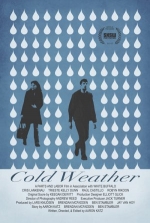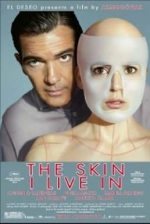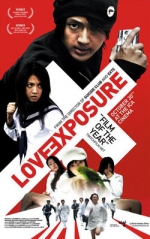We celebrate the end of the year the only way we know how: through lists, essays, and mixes. Join us as we explore the music and films that helped define the year. More from this series
 15. Bill Cunningham New York
15. Bill Cunningham New York
Dir. Richard Press
[First Thought Films]
Watching Bill Cunningham at work was one of the more wholesome pleasures offered by any film this year. This documentary found the octogenarian constantly on the move, shooting street fashion and society functions for The New York Times, never far from the Schwinn cruiser he used as transportation across Manhattan. A cheerful and lightly rumpled gent, Cunningham clearly relished the fact that, for any of his unassuming yet strikingly dressed subjects, he could just as easily have been a retired hobbyist out on a lark as an icon of the fashion industry. In the film, Cunningham described clothing as “the armor to survive the reality of everyday life,” and indeed he had his own forms of protection: his deceptively run-of-the-mill wardrobe, along with his solitary lifestyle and Spartan living conditions, made him fundamentally enigmatic. But what was there to know beyond what Cunningham wanted us to see? Both through his photography and his life, Cunningham argued that we have the tremendous power to be the arbiters of our own image. Toward the film’s conclusion, there was an unexpectedly moving moment in which director Richard Press attempted to nudge Cunningham into addressing some general impressions of the photographer’s inner life. Cunningham stayed mostly mum, but it was a deeply eloquent, and elegant, evasion.
• Bill Cunningham New York: http://www.zeitgeistfilms.com/billcunninghamnewyork
• First Thought Films: http://firstthoughtfilms.com
 14. Dragonslayer
14. Dragonslayer
Dir. Tristan Patterson
[Drag City]
Part art film, part verité doc, part scumbag Laguna Beach, Dragonslayer documents the unfocused vibrancy of a generation that’s struggling to make something meaningful in suburban landscapes of foreclosed homes and empty swimming pools. A skate documentary where instead of ollies the tricks are fatherhood, earning a living, and falling in love — and the injuries are deeper than skinned knees or broken bones — the film followed awkwardly upbeat and infinitely quotable subject Josh “Screech” Sandoval through a brief but transformational period in his life in Fullerton (the real OC), as he reentered the skating world after a bout of depression, hooked up with a longtime crush, and learned how to be a father, sort of. Plus, lots of cheap beer, drugs, and trespassing. Visually, Dragonslayer was absolutely off the hook, pirouetting between restrained realism and gorgeously indulgent abstraction with a gritty, oversaturated grace that was as memorable as Sandoval’s weird-ass skating style. But as first-time director Tristan Patterson documented his subject’s stumbles, the director’s emotional pallet proved to be even more nuanced than his aesthetic one. In lesser hands, Screech Sandoval might have merely been one of cinema’s most iconic slackers of all time. Patterson’s feat was in showing us his subject’s ambition.
• Dragonslayer: http://dragonslayermovie.com
• Drag City: http://www.dragcity.com
• TMT Review: http://tmxt.es/2irq
 13. Cold Weather
13. Cold Weather
Dir. Aaron Katz
[IFC Films]
Cold Weather was an aptly titled film. About an ex-forensic science student and Sherlock Holmes enthusiast living with his sister in his hometown of Portland, OR, this film hunkered down and moved slowly. We’d worried that mumblecore had flared out before delivering on its promise. While Aaron Katz’s film didn’t sting us like Beeswax did, it had the advantage of a couple of unique pleasures. The first: the main character got a job in an ice factory. The second: he embarked on an amateur investigation into an undermotivated and underexplained mystery involving his ex-girlfriend. Most of the film’s charm — and it ran on charm — was in its economy of movement. We were happy to wait while the characters established themselves (in greater or lesser depths). When the action got underway, it was easy to follow; it didn’t get our adrenalin coursing any more than it drew blood. This made the final scenes that much more joyful. While blazing glories had long left us cold, the conclusion of Cold Weather kindled in our breasts quiet warmth.
• Cold Weather: http://coldweatherthemovie.com
• IFC: http://www.ifcfilms.com
• TMT Review: http://tmxt.es/2drv
 12. Rubber
12. Rubber
Dir. Quentin Dupieux
[Canal+]
Michael Bay’s robotic porn series Transformers has earned over $2.5 billion worldwide, enough to purchase 50,000 private islands. But when the most open-minded film lover hears about a move where a tire comes to “life” and uses telekinesis to blow up heads, he or she wants nothing to do with it. Indeed, Rubber was a beautifully shot horror-comedy with a concept that was predictibly passed off by the general movie-going audience. For the rest of us lucky enough to see Robert, the name of the tire, roll through the California desert, we experienced satire at its finest. From hearing the plot and viewing the trailer, one may have expected a B-movie with bad acting and fun-filled gore. But while there were plenty of laughs and over-the-top violence, director and writer Quentin Dupieux gave the audience even more by breaking the fourth wall, including a side plot of binocular-wielding on-lookers watching the film take place in real-time. The commentary on Hollywood movies was purposefully spoon-fed to us while possibly unintentionally distracting the viewer from the actual craft of poignant filmmaking that unexpectedly took place. Rubber didn’t break new ground, but it undeniably treaded down a rugged path of creative ingenuity.
• Rubber: http://www.rubberthemovie.com
• Magnet Releasing: http://www.magnetreleasing.com
• TMT Review: http://tmxt.es/2ef8
 11. Certified Copy
11. Certified Copy
Dir. Abbas Kiarostami
[IFC Films]
The setup itself was already uncharacteristic for an Abbas Kiraostami film, since it almost perfectly embodied the stereotype of the European import. Set in Tuscany, Certified Copy starred Juliette Binoche as an antiques dealer who encounters an art historian and lecturer, and spontaneously ends up spending the day with him. The pair proceed to exchange a steady stream of ideas about art, philosophy, and life… in other words, your standard arthouse fare. In its first half, Kiarostami proved himself quite adept at making this type of picture, almost playing out like a Before Sunrise for the aging academic set; relaxed, beautifully written and photographed, and consistently engaging. But it’s in the second half that the film ventures into truly unchartered territory, morphing and distorting itself in a way that I’ve literally never encountered in a movie theater before. Mind you, Certified Copy isn’t the type of gimmicky exercise in jigsaw mindfuckery that requires being “worked out” (à la Inception), although it could easily be viewed that way. I prefer to experience the film as a dizzying disquisition on the nature of relationships themselves, a film that viewers ought to savor and luxuriate in, rather than attempt to decipher or decode.
• IFC: http://www.ifcfilms.com
• TMT Review: http://tmxt.es/2dau
 10. William Never Married
10. William Never Married
Dir. Christian Palmer
[Burning Ladder Films]
Christian Palmer is a singular new voice in American cinema, and it’s hard not to resort to an overabundance of superlatives when trying to describe how William Never Married established itself as such an indelible and entirely new kind of film. So I won’t even try not to. Palmer and his small crew in Seattle wrought this masterpiece with a very limited budget and the desire to turn one of the most basic kinds of stories into something completely fresh and unnervingly compelling. Palmer starred as the titular William, a budding alcoholic and obsessive young man constantly hindered by his mother’s late-stage alcoholism. Using the assured camerawork of R.K. Adams and virtuosic editing skills of both Ian Lucero and Palmer to impart just as much meaning to the film as the naturalistic and painfully awkward dialogue (which will hopefully become a trademark of this creative team), WNM embodied a gripping sense of sustained and virtually limitless loss that was as beautiful/disturbing as it was devastating. We feel altogether confident in asserting that William Never Married will maintain a pride of place among American tragicomitragedies.
• William Never Married: https://www.facebook.com/pages/William-Never-Married/120391067935
• Burning Ladder: http://www.imdb.com/company/co0277165
• TMT Review: http://tmxt.es/2d6s
 09. Drive
09. Drive
Dir. Nicholas Winding Refn
[Film District]
Following last year’s undervalued Valhalla Rising, a tone poem of sheer brutality and epic myth-making, Nicholas Winding Refn further sated his appetite for the offbeat undercurrents of machismo with the more nuanced, narrative-based Drive. Tapping into the zeitgeist’s appropriation of all things 80s, Drive exhibited a retro-chic as effortlessly smooth and precise as its driver behind the wheel; its sheen of neon-pink font upon the dark, quiet streets of L.A. coupled with the pulsating rhythms of its remarkable score, an enrapturing combination of Italo disco beats and minimal synth pop, created an atmosphere that was both familiar and alien. But Drive’s true greatness came once it peered beneath the veneer, revealing a shy stunt car driver who just wanted to do the right thing in a violent world where honor and trust sign your death warrant. Refn’s channelling of Jean-Pierre Melville by way of Walter Hill yielded a brilliant balance of minimalism amid broad gestures, where action punctuated the drama rather than drove it (no pun intended) and the tension between big moments exuded a surprisingly tender humaneness, especially in its awkwardly touching love story. The film’s ability to successfully blend both genuine emotion with artifice and tenderness with extreme tenderness made it one of the year’s most unique and satisfying experiences.
• Drive: http://www.drive-movie.com
• Film District: http://www.filmdistrict.com
• TMT Review: http://tmxt.es/2hsm
 08. The Skin I Live In
08. The Skin I Live In
Dir. Pedro Almodóvar
[Sony Pictures Classics]
By now, it’s almost a cliché to put a Pedro Almodóvar film on a year-end list. True, his last few movies may have been “disappointments,” a little too self-referential and cycling back onto some of his earlier films. But The Skin I Live In spoke more to the level of his output from Women on the Verge of a Nervous Breakdown to Talk to Her than anything else. With this film, Almodóvar took a familiar trope, the mad scientist obsessed with revenge, and transformed it through his inimitable style of absurdist melodrama. Sure, he similarly featured Antonio Banderas kidnapping a young woman in his 1991 film Tie Me Up! Tie Me Down!, acting as a subversion of the traditional role of the psychopath. But this time, Banderas’ Robert Ledgren was a less ambiguously twisted madman, yet his performance through the sinuous narrative ensured the audience would sympathize with his motives. Almodóvar’s interest in the human body and the questions of sexual identity felt somehow more at home in this one-off amalgam of science fiction and captivity horror. Whereas in the past, he might have inserted surrealist touches, à la Buñuel, to push the viewer’s visual conceptions of what it means to be flesh, The Skin I Live In intrigued us by literally grafting it on, piece by piece.
• The Skin I Live In: http://www.sonyclassics.com/theskinilivein
• Sony Pictures Classics: http://www.sonyclassics.com
• TMT Review: http://tmxt.es/2i8l
 07. Bellflower
07. Bellflower
Dir. Evan Glodell
[Oscilloscope Laboratories]
Bellflower, Evan Glodell’s directorial debut, told the story of two best friends, who, in the most blatant display of dudeness, spent their days consuming beer and bacon for breakfast and preparing for the future by building a badass muscle car for what they hoped to be the impending apocalypse. The film’s weird combination of Mad Max and mumblecore, not to mention its peculiar use of homemade cameras and moldy lenses, could very well have resulted in a messy ordeal. However, with dexterity and sensitivity, Glodell crafted it all into an enraged, energetic story about coming to terms with adulthood while the anarchic energy of youth still just wants to burn it all down. All of this was strengthened by Jonathan Keevil’s hauntingly beautiful soundtrack, whose theme song was nothing short of an anthem for the frustrated dreams of youth. Bellflower dealt with that tragic moment when we finally realize that, no matter how angry and resentful we may be, not everything in life can be fixed with a flamethrower. In a decade where indie cinema has come to mean an endless and repetitive flow of quirky characters in cute love stories coated with indie rock soundtracks, Bellflower could very well be the fiery salvation we’ve all been waiting for.
• Bellflower: http://www.bellflower-themovie.com/home
• Oscilloscope Laboratories: http://www.oscilloscope.net
• TMT Review: http://tmxt.es/2gwa
 06. Love Exposure
06. Love Exposure
Dir. Shion Sono
[Omega Project]
Writer/Director Shion Sono’s roughly four-hour-long epic about religion, obsession, perversion, the finer points and practice of upskirt photography, and the innate allure of purity knocked our socks off. Shot in an astounding three weeks and imbued with the same visual and narrative inventiveness that brought him worldwide attention 10 years ago (2001’s The Suicide Club), Love Exposure was an oddly touching and perversely (ha!) joyful experience. Perhaps owing to the crunched shooting time, this movie’s frenetic pace mitigated its gargantuan runtime, and when all was said and done, we were introduced to some of the most compelling characters to arise from the cinema in recent memory. Yu Honda’s single-minded, almost daft obsession with finding a modern version of the Virgin Mary to marry was never lampooned. And far from serving as a mere exemplar for Sono’s brutal social insights (as so many characters in this director’s other films have), Yu’s struggle to find something pure is treated with a positively Rublevian level of compassion on Sono’s part. Plus, it was undeniably entertaining and downright hilarious in parts, and definitively redefined the way boners in sweatpants should be filmed.
• Love Exposure: http://www.ai-muki.com
• TMT Review: http://tmxt.es/2f99
We celebrate the end of the year the only way we know how: through lists, essays, and mixes. Join us as we explore the music and films that helped define the year. More from this series
